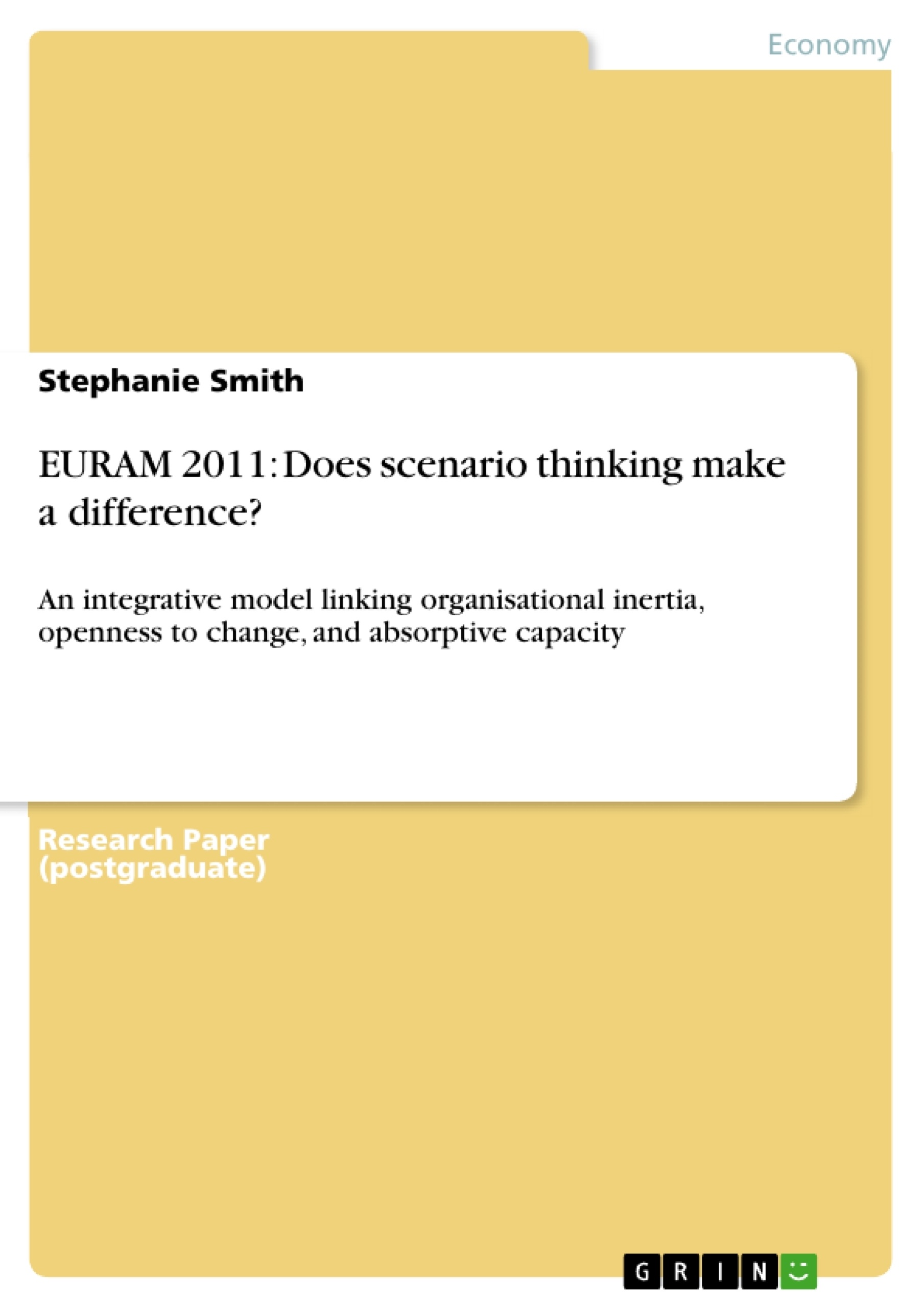Valuing or underestimating the opportunities derived from environmental changes might determine which organisation will survive and which organisation will see its viability at risk.
Organisational inertia and a lack of absorptive capacity can inhibit organisational flexibility and innovativeness. In this study, we suggest organisations to implement a pro-active search
for new opportunities, which potentially entails innovation. By adopting a micro-level perspective, we emphasise the importance of individuals within an organisation as contributor to the organisation’s success. An integrative model linking organisational inertia, scenario planning, and absorptive capacity is proposed. We present scenario thinking as a tool which may impact individuals’ openness to change, hence leads to a positive attitude towards new
information, i.e. absorptive capacity. Several propositions are derived from this multitheoretical model. We argue organisations may be presented with a promising approach to increase the motivation and capability of individuals to engage in innovative actions, and suggest further research to empirically test this model.
Inhaltsverzeichnis (Table of Contents)
- Introduction
- Theoretical background
- Organisational inertia
- Definition of organisational inertia and the value of change
- Reality of change outcome
- Absorptive capacity
- Definition of absorptive capacity
- Absorptive capacity as a result of learning
- Scenario thinking
- Scenario thinking as a tool for innovation
- Scenario thinking, openness to change, and absorptive capacity
- Organisational inertia
- Scenario thinking, openness to change, and absorptive capacity
- Discussion
- Conclusion
Zielsetzung und Themenschwerpunkte (Objectives and Key Themes)
This article aims to explore the role of scenario thinking in fostering organizational innovation, particularly by examining its impact on individual openness to change and absorptive capacity. The study proposes an integrative model that links organizational inertia, scenario planning, and absorptive capacity, ultimately suggesting that scenario thinking can serve as a tool to increase individuals' willingness to embrace change and subsequently their ability to absorb new knowledge.- Organizational inertia and its impact on change initiatives
- The importance of absorptive capacity for organizational success
- Scenario thinking as a potential remedy for organizational inertia
- The relationship between scenario thinking and individual openness to change
- The connection between openness to change and individual absorptive capacity
Zusammenfassung der Kapitel (Chapter Summaries)
The first section introduces the concept of organizational inertia, highlighting its potential to hinder successful change initiatives and prevent organizations from adapting to dynamic environments. It emphasizes the value of change for organizations, outlining the benefits of flexibility and responsiveness in the face of evolving market demands. The second section explores the concept of absorptive capacity, defining it as the organization's ability to leverage externally acquired knowledge. It discusses the role of learning and the development of individual competencies in fostering absorptive capacity. The third section delves into scenario thinking, outlining its potential as a tool to overcome organizational inertia and promote innovation. The article highlights the connection between scenario thinking and individuals' openness to change, arguing that exposure to different future possibilities can foster a more receptive attitude toward new ideas and information. The final section examines the relationship between openness to change and individual absorptive capacity, suggesting that individuals who embrace change are more likely to actively seek and integrate new knowledge, ultimately contributing to the organization's overall absorptive capacity.Schlüsselwörter (Keywords)
This article focuses on the intersection of organizational inertia, absorptive capacity, scenario thinking, openness to change, and innovation. It investigates the potential of scenario thinking to overcome organizational resistance to change by fostering individual openness to new ideas and knowledge, ultimately contributing to the development of absorptive capacity and organizational success.Frequently Asked Questions
What is organizational inertia?
Organizational inertia refers to the tendency of an organization to resist change and maintain its current state, which can hinder flexibility and innovation.
How can scenario thinking foster innovation?
Scenario thinking exposes individuals to different future possibilities, which can increase their openness to change and readiness for new information.
What is absorptive capacity?
Absorptive capacity is an organization's ability to identify, value, assimilate, and apply new external knowledge to commercial ends.
Why is individual openness to change important?
From a micro-level perspective, the attitudes of individuals determine the organization's overall ability to adapt and innovate successfully.
What is the link between scenario planning and organizational success?
The study proposes an integrative model where scenario planning reduces inertia by increasing individual absorptive capacity, leading to better survival in changing environments.
- Quote paper
- Stephanie Smith (Author), 2011, EURAM 2011: Does scenario thinking make a difference?, Munich, GRIN Verlag, https://www.grin.com/document/178281



